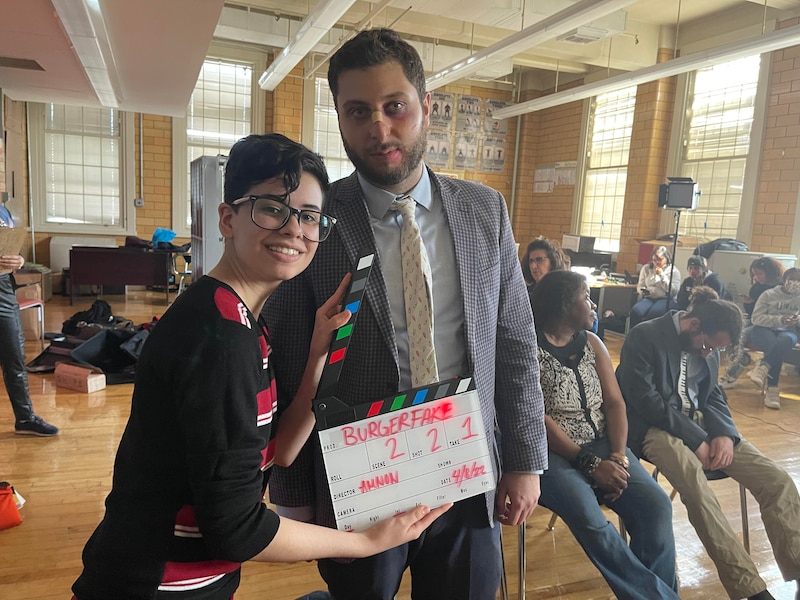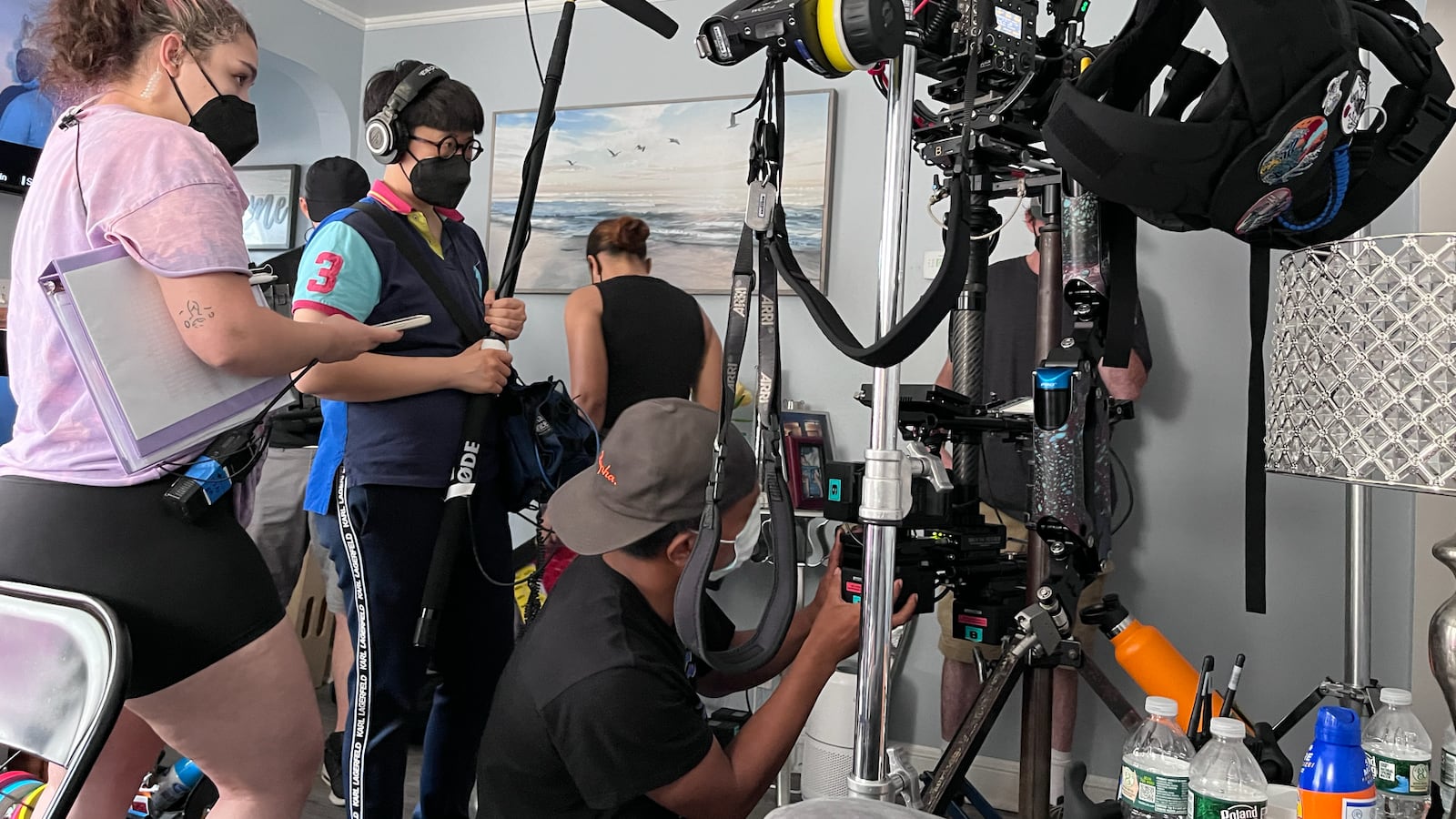Benjamin Ducoff’s students often come into his filmmaking class thinking only about the actors in front of the camera and the director calling the shots. They haven’t necessarily considered who is operating the cameras, who is holding the boom microphones, and who is transforming an empty space into a believable set.
By the time the class wraps, though, they’ve learned about everyone and everything involved in filmmaking. That’s because Ducoff’s lessons aren’t just theoretical; he and his students are making actual movies.
“I have a rule for my students: If they write a script that’s five pages or less, I’ll produce it,” said Ducoff, who teaches at Health, Education and Research Occupations High School, better known as HERO, in the Bronx. “That’s the source of most of our content.”
Recently, the teens in his classes were involved with an even more ambitious project. They worked on a feature film set. The finished product, “Yaniv,” premiered at the Cleveland Jewish Film Festival in October, with additional screenings scheduled around the country in the coming months.
Ducoff stars in the comedy-thriller hybrid about a high school teacher who needs to raise $10,000 to produce the school’s spring musical. To make some quick cash, he and a colleague join a secret gaming ring run by a group of Hasidic Jews in Queens. Their card game of choice is called Yaniv, and the two teachers hatch a plan to stack the odds in their favor.
Ducoff’s students worked on the set, earning money as they operated equipment, assisted talent, and even acted in minor roles.
“Yaniv” marks Ducoff’s first feature film, which he wrote and produced with his film director friend Amnon Carmi.
Ducoff said he knew the experience of working on a film set would be life-changing for his students.
But “I never would have guessed how obsessed they became with the project’s success,” said Ducoff, who spoke recently to Chalkbeat about how he got HERO’s filmmaking program off the ground, the technical and life lessons teens learned while making “Yaniv,” and the power of asking for what you want — even if it sounds a little ridiculous.
This interview has been lightly edited for length and clarity.
How did you decide to become a teacher?
I was a struggling artist in New York City, landing writing and acting gigs here and there but mainly working in restaurants. One day, I saw an ad for a part-time tutoring position at a Huntington Learning Center and was hired on the spot. I hated the job, but I instantly connected with the students, who were hilarious and insanely creative. From there, I became a New York City Teaching Fellow, and I’m still teaching at the same school I started at.
Why did you start teaching high school students about filmmaking — and what’s involved?
Filmmaking, and production in general, is the ultimate educational tool. It requires collaboration, a strong vision, sweat equity, and commitment. And at the end of the process, there is a tangible product worth celebrating. My greatest memories as a teenager come from my experiences doing theater, where my peers and I put all of ourselves into the productions of plays and musicals.
In 2021, when I was working as a history teacher, I pitched the idea of a filmmaking program to my principal, who enthusiastically facilitated its creation and helped me partner with the New York City Department of Youth and Community Development to get students paid for their work and training on set. Over the course of two and a half years, I guided my students through the production of a movie, from a half-baked idea to a final cut.
My biggest challenge lies in finding the right place on set for each student, based on their interests and skill sets. Most come in with the notion that filmmaking is simply acting and directing, and are surprised to discover all of the different jobs and skills that are necessary for a project to get off the ground. Then, we have to find a workflow that can keep us on schedule and under budget. As a producer, I do everything to get film projects completed, and I know that I have passed this obsessive nature onto my students, for better or worse.

Tell me about the premise of “Yaniv,” and about what role your students played in bringing it to life.
“Yaniv” is the story of a high school teacher in the Bronx who, after learning that the budget for his spring musical has been slashed, resolves to earn the money by infiltrating an underground card game run by Orthodox Jews. I wrote the script with my best friend and creative partner, Amnon Carmi, who is an accomplished director and has taught production to my students at HERO.
As we began pre-production of the film, we knew that we wanted to involve our students. What better experience is there than working on the set of a feature film?
Spread out across the art, camera, and sound departments, these students were instrumental in bringing “Yaniv” to life. We had students operating the boom mic, assisting our camera operators, dressing sets, and helping talent get where they needed to go. They helped our production designer decorate the school building we were filming in. It was the middle of summer, so when we arrived most walls were bare, and the building looked like more of a storage facility than a public high school. Our students immediately got to work, creating posters, ads, graffiti, and homework assignments. They even littered trash in all the right places.
When we needed to shoot scenes in crowded spaces, they recruited their friends to come play background [characters], and a few of them were even cast as students in the film. In fact, four of our students are now Screen Actors Guild, or SAG, eligible.
What life and work skills did your students learn while making “Yaniv”?
They learned so much! Alongside the hard skills of audio mixing, camera setup and operation, and production design, students also became proficient in the areas of teamwork, organization, creative problem-solving, and conflict resolution. I will say the biggest difference between my students and students who don’t take film is that my students know how to use spreadsheets to communicate and track progress.
What surprised you about working alongside your students to create this film?
The biggest surprise for me was students’ enthusiasm. There were so many instances where I had to remove students from the set because it was getting too late, and they were working too many hours! They were having so much fun and showed a level of professionalism that I never would have expected from a high school student. By the time we wrapped production, I was not surprised when a few of our graduating students were offered jobs on other shoots.
What’s something happening in the community that affects what goes on inside your classroom?
This is actually the basis for a course, an after-school offering, and a summer internship program that I currently teach at HERO, called Filmmaking for Social Justice. Students examine issues that face the community and then we pick up the camera and document how it affects life at school. Some topics that are currently being developed include smartphones in schools, bullying, dollar stores, community assets, and public housing.
What’s the best advice you’ve ever received, and how have you put it into practice?
The best advice I ever received came from my great-grandmother: “No one ever died from asking.” All these projects were pipe dreams until I asked for help. If you have a crazy idea, ask around. Somebody will be down to help you. Honestly, that’s really the theme of “Yaniv.”
Gabrielle Birkner is the features editor and fellowship director at Chalkbeat. You can reach her at gbirkner@chalkbeat.org.


